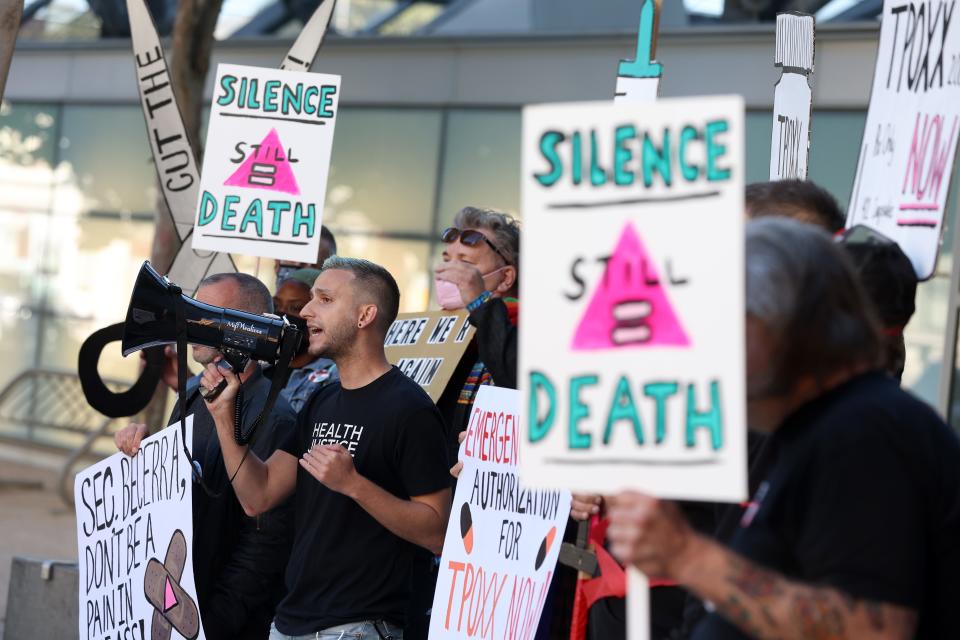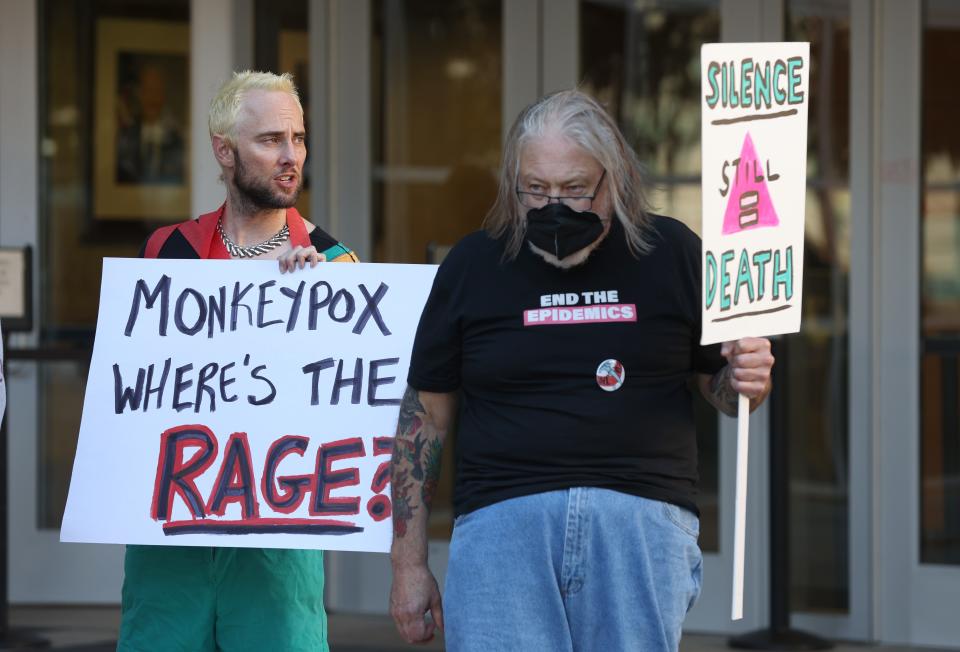'Here we go again': Monkeypox crisis unnerves AIDS activists. Have lessons been learned?
When 55-year-old Ken Pinkela was first navigating his coming out process as a gay man, the community he emerged into was no stranger to crisis.
In the throes of deadly HIV infections, gay men turned to self-made support groups to ask health care questions, organize protests and combat the isolation and stigma of illness.
So 30 years later, at one of those same monthly AIDS support groups in Milford, New York, Pinkela said he wasn’t alone in experiencing an upsetting sense of déjà vu reading about monkeypox.
"Here we go again," said Pinkela, a former Army lieutenant colonel turned HIV advocate. "Did we not learn something from those mistakes? ... When you see it now again, coming out of the gate, it's so wrong."
While the similarities between HIV, the virus that can lead to AIDS, and monkeypox may feel and appear striking, monkeypox is radically less fatal with a much lower rate of severe or lethal cases. Unlike HIV when it arrived in the U.S. in 1981, health authorities had access to reliable testing, a vaccine and proven treatment to combat a monkeypox outbreak.

New, promising data has also shown a declining rate of new cases of monkeypox in New York City and parts of California, and global cases have been dropping over recent weeks, according to the World Health Organization.
But for some historians, activists and gay men who lived through the peak of the AIDS crisis, the similarities between the two viruses – particularly around the stigma of illness and failures by the federal government to adequately respond to an outbreak – are alarming and frustrating.
Others warn of overdrawn comparisons, pointing to the distinct progress in cultural acceptance of the LGBTQ community and the difference in the symptom severity of the viruses.
But all have cited the crucial lessons learned from history and the fight against HIV/AIDS to address monkeypox, including the importance of relentless activism for equitable health care, the power of language and the value of relying on the community in times of hardship.
“I think gay men are going to do what we now have a beautiful history of doing, which is taking care of each other and taking health care seriously, and working as fast as possible to turn things around," PrEP4All co-founder and AIDS activist Peter Staley said.
How long does the monkeypox rash last?: A visual guide to how the monkeypox rash evolves.
'It definitely picks at old wounds'
Historians and activists who spoke to USA TODAY said the most striking parallel between the two viruses is also the most obvious: Monkeypox has most prominently impacted men who have sex with men. Some 98% of monkeypox cases in the U.S. are among men and 93% of cases are among men who reported recent sexual contact with men, Centers for Disease Control and Prevention Director Dr. Rochelle Walensky reported in August.
The same disproportionate impact was the case in the early days of AIDS: 92% of cases from 1981 to 1987 occurred among men, and male-to-male sex was the most common mode of exposure, according to CDC data. Gay and bisexual men remain the population most affected by HIV today.
California State Sen. Scott Wiener told USA TODAY these similarities can be triggering.
"It definitely picks at old wounds and surfaces old traumas, in terms of federal public health failure, deeply harming our community," Wiener said.
The parallels don't end there: Those who lived through the peak of HIV also see a lack of progress in how the stigma of illness is addressed, especially around diseases that can be transmitted through sexual contact.
Marcelo Maia, an 11-year member of activist group ACT UP who is HIV-positive, said stigma is a factor that "most helps to transmit" both HIV and monkeypox because of the misconceptions it perpetuates and bigotry it inflames.
Tez Anderson, 60, a long-term HIV survivor and HIV/AIDS activist, said the fear of judgment for those infected with monkeypox feels parallel to those who lived through similar experiences when diagnosed with HIV.
“Those echoes of that kind of silence and hiding and isolation are very similar," Anderson said. "It’s traumatizing for people, feeling the same way they felt.”
The stigma created by the association of monkeypox with men who have sex with men is particularly dangerous, said Dan Royles, author of "To Make the Wounded Whole: The African American Struggle against HIV/AIDS.
“It is a cultural thing about the way that we respond to illness, contagion, contamination," Royles said. "It taps into something that is bigger ... An identity that is already stigmatized now has this added layer of being not only contaminated but a threat because it might contaminate the larger whole."
People experiencing homelessness are catching monkeypox: Why experts are worried and what cities are doing.

Familiar shortcomings in response; racial disparities again an issue
In the early days of HIV/AIDS, President Ronald Reagan's press secretary Larry Speakes, joked with members of the media referring to HIV as the "gay plague" – and the White House left the deadly crisis largely unacknowledged for years.
Activists staged "die-ins" and other acts of protest at science headquarters and political events in hopes of pressuring the government to take action. But the Food and Drug Administration did not approve a test for HIV until 1985, and effective treatment wasn't available until 10 years later.
The landscape has changed drastically since then. The Biden administration held press briefings early on in the outbreak, named a monkeypox response team led by the Federal Emergency Management Agency and HIV public health experts and is working to expand access to vaccines and treatment – all steps that advocates say are radical shifts from the government response to HIV in the 1980s.
"Imagine if gay people had been invited to the White House in 1981 to talk about the new epidemic that was threatening America?" Staley said. "Imagine how history would have changed. If there was just that level of caring about what's happening to us and our opinions.”
But as much as improvements have been made, many failures in the government's response to HIV are echoed in its shortcomings in addressing monkeypox, advocates and historians say.
Health experts have said the White House missed key opportunities to limit the spread of the virus.
Tests for monkeypox were initially limited when the federal government required them to be sent to the CDC for confirmation, contracting the volume of tests that could be performed. And while the government decided to rely on the Jynneos vaccine to prevent further outbreaks, it did not immediately order doses released, causing demand to largely outstrip supply in many areas.
“It was a different failure. It wasn't a malicious failure, not like it was in the 1980s," Wiener said. "But it was still a failure."
In the cases of COVID-19, HIV and monkeypox, racial disparities in who is affected and who lacks access to vaccines and treatment have remained glaring. Black people make up about a third of cases, compared to their 12% share of the overall population, according to CDC data, and Hispanic or Latino people make up about 32% of cases, despite comprising 19% of the population.
Until our health care system shifts its energy and resources to address disparities, viruses such as monkeypox and HIV will continue to disproportionately impact the same marginalized communities, according to Rueben Warren, Director of the Tuskegee University National Center for Bioethics in Research and Health Care.
“The mistakes are predictable, and therefore should be preventable," Warren said. "And we're making the same mistakes over again, impacting on the same populations over and over again.”
Optimism, resilience on the horizon
The outlook on monkeypox is improving. Recent numbers show transmission of the virus in the U.S. may be starting to decline, especially in major cities where the virus spread quickly at the outset, such as New York City and San Francisco. The federal government is also stepping up to expand its accessible supply of vaccines, even creating a vaccine equity pilot program aimed to get the shot to the communities at the highest risk.
An administration speaking openly about monkeypox and widespread media coverage are a massive step forward from the 1980s, said Sarah Schulman, an AIDS historian and author of “Let the Record Show: A Political History of the AIDS Coalition to Unleash Power New York.”
“Monkeypox and COVID are public collective conversations in the mainstream media ... AIDS was like a private nightmare, and our fight was to get it into the public," Schulman said. "We're in a completely different environment.”
From before the peak of the HIV/AIDS crisis to the present day, gay men have turned to the community for strength in numbers to draw attention to disparities, push for better health care and find comfort during times of illness and struggle.
Much has and will continue to be learned from the experience and wisdom of HIV/AIDS activism and LGBTQ elders, according to Michael Adams, CEO of SAGE, an advocacy group for LGBTQ seniors.
"AIDS forced many in our community to come out of the closet and to stand up and fight for themselves," he said. "We’re a much stronger community than we were back then ... we carry these lessons forward and we're putting them to good use in the face of monkeypox.”
This article originally appeared on USA TODAY: As monkeypox cases spread, AIDs epidemic history surfaces old wounds

